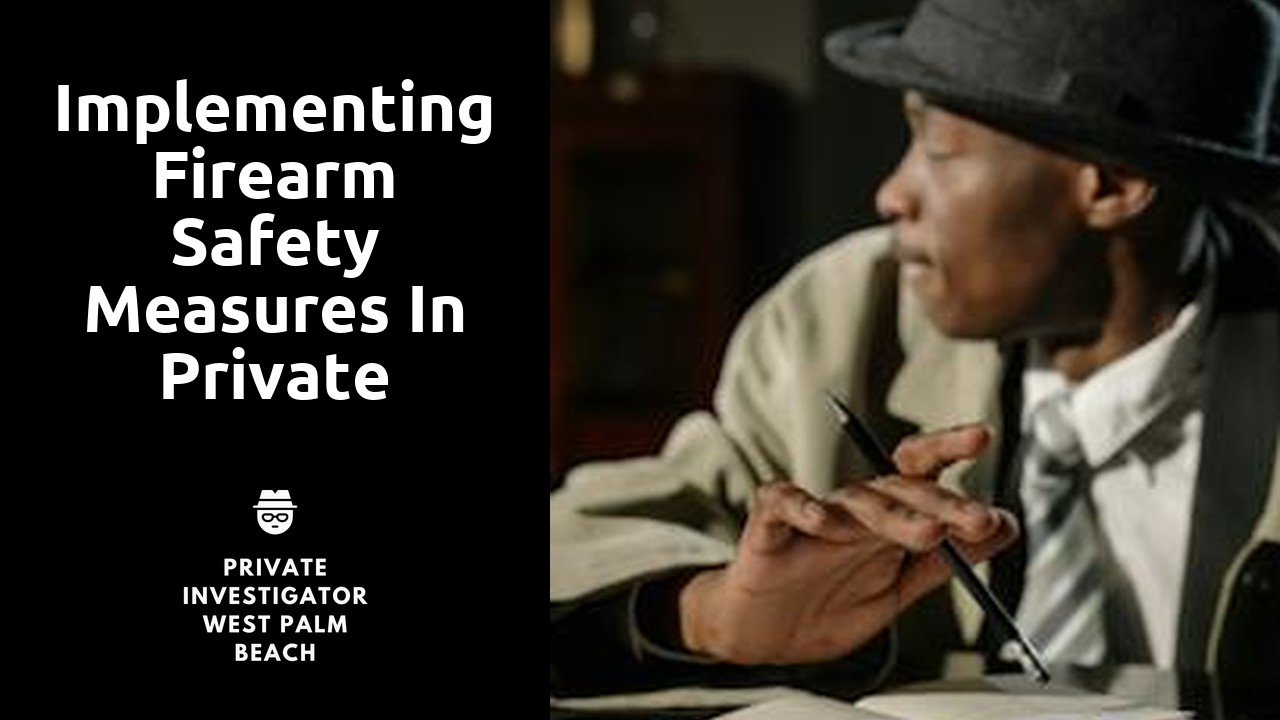
Implementing Firearm Safety Measures in Private Investigation
The Importance of Proper Firearm Handling in Private Investigations
Proper firearm handling is of utmost importance in private investigations, where the use of firearms may be necessary in certain situations. Effective handling requires a combination of knowledge, skill, and discipline. Private investigators must prioritize safety at all times and ensure that they have a thorough understanding of firearms and their operation.
One key aspect of proper firearm handling is maintaining control of the weapon at all times. This includes keeping the firearm secured when not in use and never allowing it to fall into the wrong hands. Additionally, private investigators must be proficient in handling their firearms both in a controlled state and during high-stress situations. This requires regular training and practice to develop the necessary skills and muscle memory for quick and accurate weapon manipulation. Overall, the importance of proper firearm handling in private investigations cannot be overstated, as it directly impacts the safety of both the investigator and those involved in their cases.
Enhancing Safety Protocols for Firearm Use in Private Investigative Work
Enhancing safety protocols for firearm use in private investigative work is of utmost importance. When handling firearms, private investigators must prioritize the safety of themselves and those around them. This can be achieved by adhering to strict guidelines, such as proper firearm storage, regular maintenance, and ongoing training.
One crucial aspect of enhancing safety protocols is establishing clear procedures for firearm storage. Private investigators should always store their firearms in secure locations, such as lockboxes or safes, when not in use. This helps prevent unauthorized access and reduces the risk of accidents or misuse. Additionally, regular maintenance is essential to ensure that firearms are in proper working condition. Private investigators should routinely inspect their firearms for any signs of damage or malfunction, and promptly address any issues that are identified. By implementing these practices, private investigators can greatly reduce the chances of firearm-related accidents and promote a safe working environment.
Mitigating Risks: Firearm Safety Best Practices for Private Investigators
Private investigators frequently work in high-stress and potentially dangerous situations. As part of their job, they may be required to carry firearms for self-defense purposes. However, with this added responsibility comes the need for stringent firearm safety protocols to ensure the well-being of both the investigator and those around them.
One best practice for private investigators to mitigate risks when handling firearms is to undergo regular and thorough training. This training should not only cover basic firearm handling techniques but also provide education on situational awareness and decision-making in potentially threatening situations. By staying up-to-date with the latest safety procedures and best practices, investigators can minimize the chances of accidents and errors that could lead to harm or legal implications. Moreover, continuous training can help develop muscle memory and improve response time, crucial factors in high-stress scenarios where split-second decisions may be necessary.
The Role of Firearm Safety Training in Private Investigation
Firearm safety training plays a crucial role in private investigation work. As private investigators often find themselves in dangerous or high-risk situations, it is paramount that they are well-prepared and equipped to handle firearms responsibly. Proper training ensures that investigators understand the fundamental principles of firearm safety, including how to handle, store, and carry weapons safely. By undergoing comprehensive training, investigators can mitigate the risks associated with firearms and minimize the likelihood of accidents or unintended harm.
In addition to promoting safety, firearm training for private investigators also fosters confidence and proficiency in handling firearms. The rigorous training programs provide investigators with the knowledge and skills necessary to handle a wide range of situations effectively. These programs typically cover topics such as marksmanship, shooting techniques, tactical decision-making, and legal aspects of firearm use. By honing their skills through training, private investigators can act swiftly and efficiently when faced with potential threats, ensuring the safety of themselves and others involved in their investigations.
Ensuring Accountability: Firearm Regulations for Private Investigators
Firearm regulations play a crucial role in ensuring accountability among private investigators. These regulations are put in place to prevent misuse of firearms and to protect the safety of both the investigators and the public. By adhering to these regulations, private investigators can demonstrate their commitment to responsible firearm handling and contribute to the overall professionalism of the industry.
One of the key aspects of firearm regulations for private investigators is obtaining the necessary licenses and permits. These certifications verify that the investigator has undergone proper training and has met the required standards in firearm safety. Additionally, the licensure process includes background checks and eligibility criteria, further ensuring that only individuals who are fit to handle firearms are able to engage in investigative work. By adhering to these regulations, private investigators not only comply with the law but also demonstrate their commitment to accountability and responsible firearm use.
Protecting Lives: Incorporating Firearm Safety Measures in Private Investigation
Incorporating proper firearm safety measures is crucial for private investigators to protect lives and maintain a high level of professionalism in their work. The use of firearms in private investigation requires strict adherence to safety protocols to ensure that accidents and injuries are avoided. By following these measures, investigators can mitigate risks, enhance overall safety, and instill confidence in their clients.
One important aspect of firearm safety in private investigation is comprehensive training. Private investigators should undergo rigorous training programs that cover all aspects of safe firearm handling. This includes learning how to properly load and unload firearms, practicing accurate and controlled shooting techniques, and understanding the appropriate use of force. Training should also emphasize the importance of situational awareness and de-escalation techniques to minimize the need for firearm use in the first place.
Related Links
Practical Application of Firearms Training in Private InvestigationSelecting the Right Firearms for Private Investigation Work
Integrating Psychological Understanding in Investigations